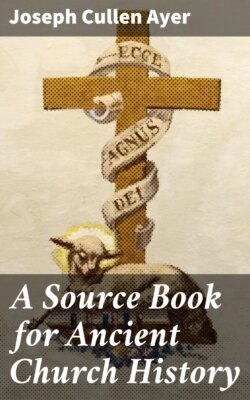Читать книгу A Source Book for Ancient Church History - Joseph Cullen Ayer - Страница 77
На сайте Литреса книга снята с продажи.
§ 21. The Earlier Gnostics: Gnosticism in General
ОглавлениеGnosticism is a generic name for a vast number of syncretistic religious systems prevalent, especially in the East, both before and after the Christian era. For the most part the movement was outside of Christianity, and was already dying out when Christianity appeared. It derived its essential features from Persian and Babylonian sources and was markedly dualistic. As it spread toward the West, it adopted many Western elements, making use of Christian ideas and terms and Greek philosophical concepts. Modified by such new matter, it obtained a renewed lease of life. In proportion as the various schools of Gnosticism became more influenced by Christian elements, they were more easily confused with [pg 077] Christianity, and accordingly more dangerous to it. Among such were the greater schools of Basilides and Valentinus (see next section). The doctrines of Gnosticism were held by many who were nominally within the Church. The tendency of the Gnostics and their adherents was to form little coteries and to keep much of their teaching secret from those who were attracted by their more popular tenets. The esoteric element seems to have been the so-called “systems” in which the fanciful and mythological element in Gnosticism appears. This, as being the most vulnerable part of the Gnostic teaching, was attacked most bitterly by the opponents of heresy. There are no extant writings of the earlier Gnostics, Simon, Menander, or Cerinthus. They are known only from Christian opponents.
Sources for the history of Gnosticism: The leading sources are the Church Fathers Irenæus, Hippolytus, Tertullian, Clement of Alexandria (all translated in ANF), Origen (in part only translated in ANF), and Epiphanius. The accounts of these bitter enemies must necessarily be used with caution. They contain, however, numerous fragments from Gnostic writings. The fragments in the ante-Nicene Fathers may be found in A. Hilgenfeld, op. cit., in Greek, with commentary. For the literary remains of Gnosticism, see Krüger, §§ 22–31. The more accessible are: Acts of Thomas (best Greek text by Bonnet, Leipsic, 1903, German translation with excellent commentary in E. Hennecke, Neutestamentliche Apokryphen, Tübingen and Leipsic, 1904); Ptolemæus, Epistle to Flora (in Epiphanius, Panarion, Hær. XXXIII); Hymn of the Soul, from the Acts of Thomas (text and English translation by Bevan in Text and Studies, V, 3, Cambridge, 1897, also translated in F. C. Burkitt, Early Eastern Christianity, N. Y., 1904).
